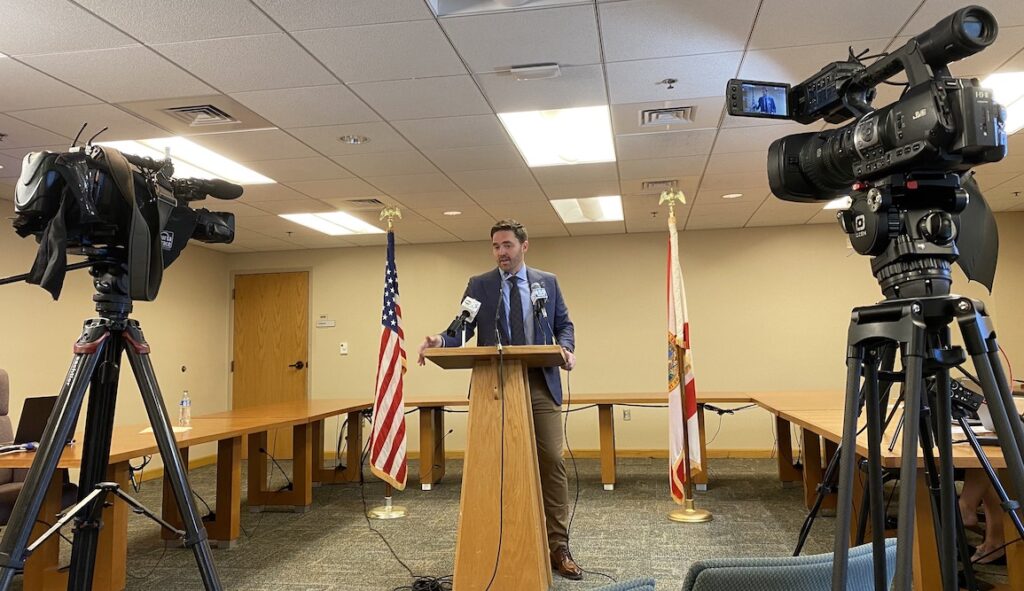By Jeremy Morrison
Upon his return to Pensacola from Washington, D.C., Mayor D.C. Reeves said that he felt encouraged about the flow of various federal dollars down to the local level.
“Everyone at the federal level really understands that mayors, municipalities, cities are really the first line of defense to the taxpayer,” Reeves said, during his weekly press conference Jan. 24.
Mayor Reeves had traveled to the nation’s capital for the annual United States Conference of Mayors gathering. The event involved local leaders from around the country visiting D.C. and hearing from federal officials, such as the attorney general and secretary of transportation.
“The mayors of every large city in the United States were there,” Reeves relayed. “We all went to the White House of Friday and got to hear about the infrastructure bill coming down from the person who’s going to administer it, as well as the president of the United States.”
Pensacola’s new mayor said that his trip to the nation’s capitol allowed him to forge useful relationships and also proved reassuring that the federal government understood the importance and impact of local governments.
“They are very mindful of that and they understand that here at the city level is where change can really happen quickly, so that was encouraging to hear,” Mayor Reeves said.
NOGO
The city of Pensacola’s aspirations to secure tax-credit financing with a goal of creating affordable housing units on property being vacated by Baptist Healthcare have fallen flat. Mayor Reeves softened the news with a reminder of how competitive the tax credits were.
“Obviously, as we’ve talked about before, it was very competitive,” Reeves said in announcing the city’s failed bid.
Late last year, Pensacola teamed up with Baptist Healthcare in a bid for to secure both a 4 percent and a 9 percent tax credit financing for two separate affordable housing projects. The effort required the city to create a Local Government Area of Opportunity and commit $460,000 to the effort.
Prior to applying for the financing, both city and hospital officials stressed the competitive nature of the bid, particularly for the 9 percent option. Mayor Reeves pointed out when discussing the failed effort, that of the 52 applications received for the 9 percent state financing, only eight were chosen.
“It’s extremely competitive as we’ve said all along and it’s not uncommon for developers to have submit multiple years, there’s plenty of precedence for that, in fact, almost customary,” Mayor Reeves said.
While the city will try again for the financing options this year — with applications due in the fall — Reeves said he is not sure if the application will be attached to the potential projects of the campus that Baptist is vacating upon its move to a new location.
“There’s a lot of moving parts and variable about where we go,” the mayor said, explaining that “right now, we don’t know where we go here at this point.” “It’s just a matter of getting our feet back under us and reassessing what’s the best step forward.”
Downtown Market Expansion?
Pensacola’s downtown market has been growing for years. Currently, its spread out each Saturday over a stretch of Palafox that has grown from MLK Plaza to the surrounding blocks.
Now, there are efforts afoot to expand the market further with a satellite location at Plaza Ferdinand, a move that city officials are hoping energizes an additional sector of downtown and also activates a currently sleepy park.
“This is going to be our first step in activating a treasure in our downtown and activating a heart of our downtown,” Mayor Reeves said.
Reeves said he was in discussions with the Downtown Improvement Board, which operates downtown’s Saturday market, about the potential for expanding the event to Plaza Ferdinand. The move would require that the city change current use restrictions for the park; the mayor described the city’s current rules against events in the park as “maybe a little bit of an overreach of restrictive use.”
“There’s some nuance to it that we’re working through,” the mayor said. “I would say we’re getting pretty close to the finish line, working out some tweaks to the ordinance, as well as the inter-local agreement with the Downtown Improvement Board.”
